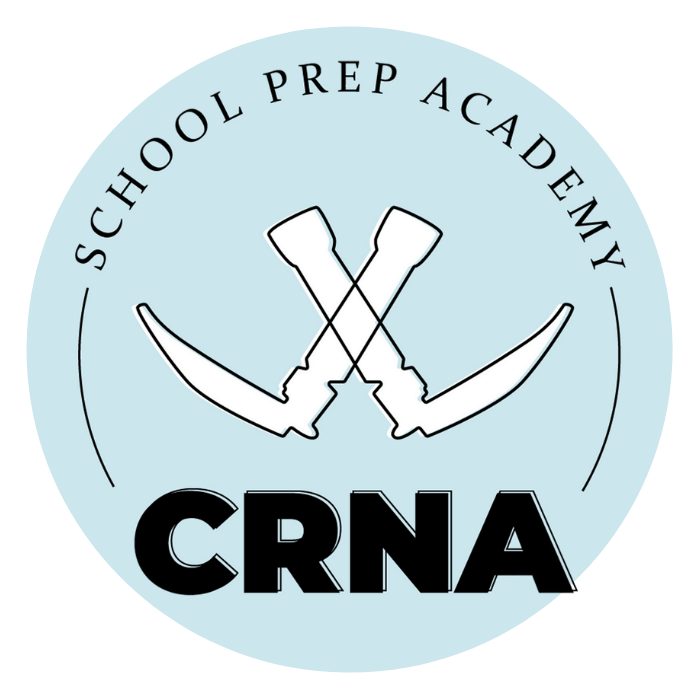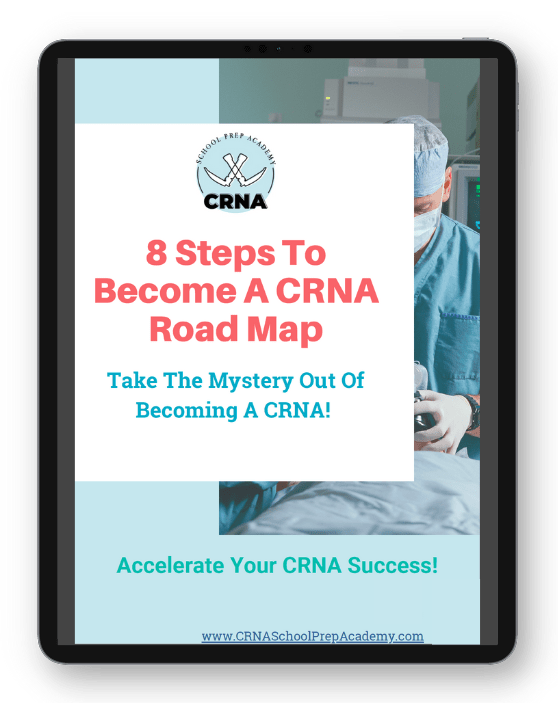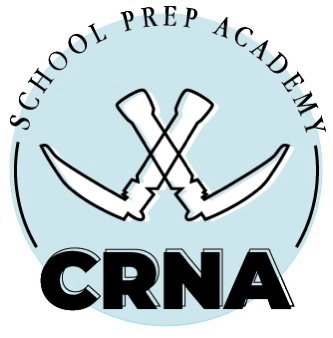
In this episode, we dive into pursuing CRNA school with less than one year of ICU experience- Should you do it, or should you not do it? Tune in to learn what factors to consider when deciding on the right amount of ICU experience for you and your program!
Sign up for the Nursing School to CRNA Accelerator Course Waitlist here!
https://www.cspaedu.com/accelerator
Get access to planning tools, valuable CRNA Faculty guidance & mapped out courses that have been proven to accelerate your CRNA success! Become a member of CRNA School Prep Academy here:
https://www.crnaschoolprepacademy.com/join
Book a mock interview, resume edit or personal statement critique:
—
Watch the episode here
Listen to the podcast here
Going To CRNA School With Less Than 1 Year Of ICU Experience
How Teed Up Is Your Application
We are going to talk about pursuing CRNA school with less than one year of ICU experience. Should you do it? Should you not do it? Let’s get into it. First and foremost, I want to ask you this, how teed up is your application, and do you feel ready? If you were to have less than one year of ICU experience, do you truly feel ready to embark upon your CRNA journey? Do not compare your timeline to anyone else’s. I have had students who are ready and teed up. They have been told by their coworkers or peers “What are you doing? You are crazy. Use your time in the ICU, build your skills.”
I do not think that is bad advice because I see the value in that. I also think you need to hold true to what you want to do. It is your life and timeline, so you decide. Let’s talk about that. While I am a big proponent of utilizing your time in the ICU to gain that experience, it is going to serve you well as a CRNA student, I also want to add that some students do fine with the bare minimum ICU experience.
One of those was one of my good friends. She had six months of ICU experience and was accepted. By the time she started her program, she had met that one-year minimum. That is another thing to consider too- If you do apply to CRNA school with less than one year of ICU experience, more than likely, you are going to have to sign some paperwork that states you will remain full-time up until you start the program.
Some programs require this, regardless of the number of years of ICU experience you have but especially if you will barely meet the minimum, they will definitely require this of you. If you were to break that, you would potentially be forfeiting your seat in the program. Keep that in mind before you decide, “I got in. I am going to leave the ICU.” Do not do that because you are there for a reason.
I have other episodes that speak to why ICU nursing is so important prior to CRNA school. I do encourage you to check out those episodes. Your time in the ICU is to build the foundation you will need to be successful, not only as a student but as a CRNA. Make sure you read those episodes and understand why your time in the ICU is so important.
We are going to talk about some of the things to consider if you are going to push forward with applying to CRNA school prior to meeting that one-year mark. I have mentioned how teed up your application is. I shock a lot of students when I say that you should be starting to work on your application one year prior to the deadline.
They are like, “Are you crazy, Jenny?” I might be crazy but I have a method to my madness. It is because sometimes, when you start actively working on your application, you are like, “I did not even realize I needed this. I did not think about that but that might be a challenge for me to get. I have to now pivot and do some extra things that take time.”

Maybe you do need to take an extra Science course because maybe your Science GPA is lower than what you thought it was. By starting to engage in the application process actively, you will uncover your blind spots sometimes. Hopefully, that is the whole hope if you start a year out, and then you are going to have time. You are going to have time to pivot.
You are going to have time to do extra things and go the extra mile, which tends to be the more competitive candidates. Do not rush into applying to CRNA School. The more time you give yourself to embrace the challenges of making sure you are teeing up your application, the better off and more competitive you are going to be when you actually apply.
What does it mean if you have less than one year of ICU experience? You are probably going to start working on your application before you even graduate from nursing school. That is how serious I am. You should be researching your school’s requirements, know exactly what you need, what you already have, etc. What is your GPA? Have you broken down your GPA? Do you know what your overall is? If you have an ADN and a BSN, what is your ADN? What is your BSN? From your ADN, what is your Science GPA? You need to understand what your GPA is so you understand what you potentially need to have to go forward with your application.
Some schools require prerequisites, and here is where this gets a little tricky too, where sometimes students think, “I have a BSN degree from a well-known college. I am good. I am all set.” Not always. Nursing schools have made a lot of changes over the last number of years. Sometimes they do not even require a full-blown chemistry course. They just require an intro to chemistry.
That is not enough to apply to most CRNA programs. Most CRNA programs require organic chemistry or biochemistry, at least a couple of series of them and with labs. If you have chemistry but it does not have a lab, and it is an introductory course, you are going to have to complete that requirement before you can even apply.
Now can you understand why you have to plan a year out? You might think, “I have a BSN from a reputable college. I am okay. I have everything I need to apply to CRNA school.” You might not. The sooner you recognize that and can take action, the better off you are going to be as far as applying to CRNA school right away.
Reference letters. Do you have a plan? As I spoke to in the last episode, as far as who do you ask for references, when, what, where, how, and all that stuff. You do not want to start your time in the ICU on orientation and ask for a letter of reference for CRNA school. You do not want to do that. What is your plan for references? Do you have a faculty picked out? Do you have a current nurse manager or an attending picked out?
Don't compare your timeline to anyone. Some students do just fine with the bare minimum ICU experience. Click To TweetWhat is your plan, and when are you planning on asking them? That can get a little tricky because, as I spoke to in that episode, you do not want to wait until the last minute but if you barely have six months of ICU experience, you are going to have to work extra hard to make sure you establish the fact that they would agree that you are ready to apply to CRNA School.
Think about how it is going to look to them. You started, and now you are asking for a letter of reference to go to CRNA school. Maybe they would say, “You just started on our unit.” Maybe they would not even want to give you a letter of reference. They could say no, so then what is your plan if that happens? If you have not checked out the last episode, I encourage you to go back and do so.
Requirements And Recommendations
Next, have you met all the requirements and recommendations? Not just the requirements, what about the recommendations? As I spoke to before, a lot of these programs will require and recommend certain things but a lot of times, the recommendations are things that can make sure that you are competitive when it comes to the fact that these schools get tons of applicants.
Not that you have to have the recommendations. You can still apply, and you may still get an interview but you want to try your best to have everything they even recommend as well as require some of these things that could hinder you, one of them being the CCRN. You cannot have until you have at least one year or 750 hours, which is equivalent to about 36 hours full-time for one year of nursing experience under your belt, before you can sit for the CCRN. I have had some nurses say, “I will cram these extra overtime hours so I can sit through the CCRN sooner.” Still, sometimes it is not more than 8 or 9 months out unless you are working 100 hours a week, which I hope you are not doing. Think about that.
Some schools require the CCRN, so automatically, you would not be able to apply to those schools. Knowing the programs that you plan on applying to is key to making a quick entry into CRNA school as far as making sure you have leadership. It’s hard to do when you barely have enough ICU experience to join a committee. Think about that ahead of time. What is your plan? How are we going to get involved?
Maybe that is not even on your unit, maybe that is with the AACN or maybe that is with another nursing body of some kind to do leadership roles. Most programs are going to expect you to have some leadership role during your time as a nurse. What is your plan? Also, shadowing some people unfortunately, I wish this was not the case. I feel like I preach it all the time.
If you follow me, you are probably gung-ho about getting shadow experience but this is important to do early on. You need to have a shadow experience. Some schools do not require it but it looks weird to have you apply for a very expensive and time-consuming program when you have never seen a CRNA in action. They do not want you to make a mistake. They want you to be happy. Shadowing, not just once to check a box on an application but multiple times, shows them that you are interested, invested, and passionate about pursuing CRNA.

Getting shadow experience, making sure you are doing that early and often; some of these things a year out, you need to be thinking about. Even as a nursing student, you need to be thinking about these things if you want to gun it into CRNA school. Also, what is your plan on going straight to the ICU? You have to have a plan because not everyone gets hired straight into the ICU. That, in itself, can be a challenge. Do you have a plan of action as a nursing student to go straight into the ICU? One of the best ways is to work as a nurse’s aide in the ICU and apply to a residency program.
—
Is this episode resonating with you? If it is, I have something exciting to share with you. I am developing an Accelerator Course for nursing students who are pursuing CRNA. I want to accelerate your success. I want to make sure that you have all the knowledge and tools you need to make this journey successful. Things like how to land the best ICU job, what are some things you need to be doing in the ICU to best utilize that time, and how to network and grow within this community and make an impression that will serve you well down the road.
I want to make sure that you can take the necessary steps early and often so that way, you find success in this journey. I know all too well how many people want to pursue CRNA but if you do not have the mentorship and the guidance, it can quickly get overwhelming and sometimes so much so that you give up on it altogether.
I have had students come back to me after years of giving up on CRNA only to pursue an advanced career as an advanced practice nurse in some other field or come back to CRNA wishing they would have stuck with it. I do not want to see that happen to you. I want to make sure that if you want CRNA, you have all the tools that you need to make this dream a reality. Go ahead and sign up. I hope to see you there!
—
The way you get into the residency program is by working hard as a nurse’s aide in the ICU. It is extremely hard work but it will pay dividends. Leave your nice cushy job where you can work, study, and work in the hospital. If you want to gun it to the CRNA school, you are going to give yourself the best shot by doing it that way.
Many students are like, “I have this cushy job where I am an office clerk and can spend half the time studying that I am actually there,” but you want to go back to CRNA school right away…The reality is if you want to get right into a residency program as a new grad, you are going to have to have some nursing experience under your belt as a nurse’s aide.
Interview Process
Keep that in mind. Your other options are to start on the step-down or the floor. Move to the step down rather than the ICU. As you can see, you are not going to gun it to CRNA school if you do not start straight into the ICU, so have a plan to make that happen for yourself. The next thing you have to think about is the interview process because you are in for a treat. I am making light of a situation because it is true. It is intimidating. It is scary. All CRNA schools have slightly different interview styles, as we teach a lot in CRNA School Prep Academy and how to prepare for those interview styles.
If you're not building the connections, you will quickly fall behind. Click To TweetIf you are not at the CRNA School Prep Academy, what are you waiting for? You need to join. You can learn all this information in detail so you can best prepare. However, during the interview process, you need to be thinking about this. As I preach to our students, when you start the application phase, which is about a year prior to the deadline of the application, you also need to be starting to tiptoe into the land of preparing for your interview.
You might be like, “That is so soon.” It is, but you know why? You are not building memory here. You are building understanding. You are building core concepts that will aid in your critical thinking that will not only play into your time as an ICU nurse but will display to the program faculty that you are invested and a critical thinker.
You are going to slide into the CRNA program, and you are going to perform very well in the clinical study. They assess this knowledge. Knowledge is teachable but if you can work on building your foundations so you can build upon them, you are going to make your life so much easier. Good students struggle in CRNA school. Just because you are a 4.0 in nursing school does not mean you are going to think CRNA School is a walk in the park. I promise you that. It goes into how much you understand. I see so many great students who focused on memory in nursing school. They got straight A’s. They did well. They get to CRNA school and struggle.
They struggle because they do not build good study habits. They focused on memory which they have a good memory but it is too much for CRNA school. There is too much to know and too many connections to make. If you are not building the connections, you will quickly fall behind. Recognizing this early, even while you are in nursing school, is pivotal to your success down the road.
In the interview process, you build this in the ICU, and if you are going to skip over a big part of the ICU, it means you got to be more self-motivated to do it on your own outside of context. That is incredibly hard. I am not saying it is not possible but it is going to be an extra challenge that you will face to build critical care knowledge without context. Context is physically doing it. It is physically seeing the GI bleed. It is physically seeing someone with respiratory failure. When you learn critical care knowledge, while you can visually put it in context, you tend to understand it better.
You are able to display that and your knowledge when asked about it. If you are going to skip through some of that process, you have to be more self-motivated to take it upon yourself to try to get that understanding on your own. Keep that in mind for the interview process. Also, assessing who you are. A lot of these interview processes try to see what your emotional intelligence is. Part of emotional intelligence is self-awareness. I am speaking from my own past self of where I was when I was 18, 20. I would like to think I have grown in my emotional intelligence but I definitely know I lacked a lot of it when I was twenty years old.
I thought a lot about myself but not in a way that, “How do I impact others?” It was more about, “What can I do for me?” That is a maturity thing. That is a life experience thing. I am not saying it is not possible. I 100 million percent believe you can build emotional intelligence, grit, and a growth mindset but it does take awareness. It takes time for you to self-reflect on things and assess who you are, not just who you are but how others see you and how you interact with others. Start assessing that. It cannot hurt you. It is only going to help.

Also, in ICU experience, in general, when you are new, you are not going to get the sickest of the sickest patients. If you are a newbie or fresh out of orientation, are they going to give you the single patient who is on a RotoProne bed? No, they are not going to do that to you. It is going to take time to get sick patients as an ICU nurse when you are new, which also means you are not going to have as many opportunities to do things like balloon pumps, CRRT, and other advanced life support measures. You are going to get more of the stable double, stable triple.
That is awful but I know they are tripling, maybe even quadrupling, some assignments in ICUs. That being said, they try their best. It does not always work out that way because let’s face it: If you have an ICU patient, at any moment, they could just hit the toilets. Your stable double can turn into a really busy, crazy shift. You do not always get the sickest of the sickest patients.
From my experience as an ICU nurse, I had a walkie-talkie patient. One of the first codes that I ever had in the ICU, walkie-talkies, is what we call them because they could walk and talk, and they were not intubated. She was on a different service transferring out. They did not make it through the night. I get that you are like, “Jenny, all the patients in our ICU are the same. They are all sick.” I do understand that.
When you can’t place the fact that you have advanced life support measures on your resume like CRRT, balloon, pumps, and ECMO, you are going to be competing with people who will have that. I wanted to point that out. Not that this is the end of the world but seek out how to gain this experience as quickly as possible. It is going to suit you well. Not before you are ready. When I got off orientation as an ICU nurse, I was fresh to the ICU out of nursing school. I worked there as a nurse’s aide. I had a good understanding of what I was getting myself into.
I was extremely overwhelmed for a lot of reasons but the knowledge gap, for sure, the pressure, the stress. I did not want to jump right into taking a balloon pump or CRRT. I did not do those things until I was about a year out of my orientation. I started doing more advanced life support measures. I also did not go back to CRNA school until I had three years of ICU experience.
Mental And Financial Preparedness
I applied to CRNA school at two and a half years but that being said, I had a year of taking the sickest of the sickest patients under my belt at that time. Think about that and try to think how you can and if you are ready to try to take more critically sick patients on your unit. Last, I want to leave you guys with this thing to think about. Are you mentally and financially ready as well as do you have the support to go back to CRNA school? You have got to think about these things.
Everyone is different in their financial journey. Everyone feels differently about loans. I lived on a lot of loans in my undergrad years. Taking out more loans for grad school was like, “Got it. What is the point? I already have tons. Bring them more.” Be responsible about that. The way I used to always think about it in my mind is the debt-to-income ratio. I still do that, saying, “What is my income, and what is my debt-to-income ratio?”
It takes awareness to build emotional intelligence. You need to self-reflect and assess how you are, how you interact with others, and how others see you. Click To TweetIf it was over 100%, that could be a little daunting to get over. Think about it. You buy a house. That is putting yourself in the debt-to-income ratio of over 100%. People do it all the time but you have 30 years to pay off your home where people will think like, “I’ve got to get through grad school and pay off in five years.” It might not be realistic if you do not have any savings and financial support to go back to school. It might take you more than five years to pay off your Graduate degree but it is one of the best investments you will ever make, better than your house for sure.
Think about that and be realistic with what your expectations are like financially during school, your means of living, for example. You are going to have to cut back and live pretty modestly even after school if you are smart about it. Gauge how ready you are for that. Also mentally; CRNA school, as I try to express to you, is pretty rigorous, and it is not for the faint of heart in the sense that you need the support. Anyone can do it.
Let me embrace the fact that any of you can do it that are reading now. You can tackle CRNA school. I 100% know you can but I want to make sure that you have a good handle on how do you cope with stress? What is your mental wellness like currently? What are you doing if you are feeling like, “Jenny, I am not in the best place?”
What are you doing about it? You do not go on to CRNA school in a bad place. You know from your time working in ICU or you will see that when you put stress on dysfunction, the dysfunction gets worse. Think about that for yourself. How are you doing? How are you now? Are you ready to go back for a very rigorous program? Are you mentally able to? Do you have a support system? Are your friends and family on board? They are like, “Whatever you say, Jenny, we will give it to you. Whatever you want and need, we will not bother you. We will not ask you to do all the things. We understand your time commitments for school.”
Do they know? Do they support you? If they do not, how are you addressing that? How are you okay with that? You need to be, and you need to be thinking about these things ahead of time. The last thing you want to do is work your butt off, get into CRNA school, and realize, “I cannot do this”. It is hard to come back from being dismissed from a CRNA program.
My whole goal is I want to get you into school. I want you to gain acceptance to CRNA school. What we are actually doing with CRNA School Prep Academy is building successful students. These programs want successful students. Even a good student can struggle. That is where we come in, where we build the foundations for you to be successful, not just gain acceptance. It does not matter when you get acceptance if you are not successful afterward.
I want to try to stress that and give you something to think about. I hope you found this episode insightful. I hope it was not too heavy for you. I hope it was giving you encouragement that you can do it but I outlined a pathway for you to think about if you want to gun it to CRNA school. You can do it. As I spoke, one of my good girlfriends did it. She is the best CRNA I know. She is amazing. She loves her job and has done great from day one. I actually had another student who gained acceptance after four months of ICU experience.

After she gained acceptance, she had to wait. Her school starts almost a year later. She will have a year and a half by the time she starts. Even though you apply to CRNA school with very little under your belt, a lot of these schools, you do not start right away. You typically start 6 to 9 months after you gain acceptance. Something to think about. I hope you enjoyed this episode, and I will see you next time.
Important Links
- How To Get Good Letters Of Reference For The CRNA School Requirement – Previous episode
- Nursing Student to CRNA Accelerator: https://www.CSPAEdu.com/accelerator
Get access to planning tools, valuable CRNA Faculty guidance & mapped out courses that have been proven to accelerate your CRNA success! Become a member of CRNA School Prep Academy here:
https://www.crnaschoolprepacademy.com/join
Book a mock interview, resume edit or personal statement critique:
Join the CSPA email list: https://www.cspaedu.com/podcast-email
Send Jenny an email or make a podcast request!


